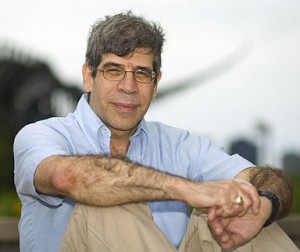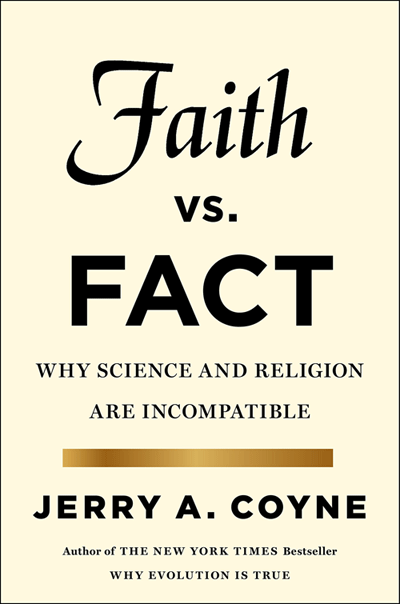Book Review: Faith vs. Fact: Why Science and Religion Are Incompatible
 Author Jerry Coyne
Author Jerry Coyne Jerry A. Coyne is a professor in the Department of Ecology and Evolution at the University of Chicago. As a scientist, his day job involves performing genetic analyses on fruit flies in order to better understand the evolutionary processes that lead to distinct species. Coyne has written more than one hundred peer-reviewed scientific papers and he is the coauthor, along with H. Allen Orr, of the scholarly book, Speciation. Dr. Coyne is also well known for popularizing scientific discoveries about the origins of species in his 2010 New York Times bestseller and eponymous website, Why Evolution Is True. His latest effort, out tomorrow, is Faith vs. Fact: Why Science and Religion are Incompatible.
Faith vs. Fact begins with an anecdote that should resonate with nonbelievers: After presenting a lavishly illustrated lecture on evolution, the author was approached by a theist who was in attendance. While admitting that Coyne’s scientific evidence was “very convincing,” this individual nonetheless concluded, “but I still don’t believe it.”
“I was flabbergasted,” Coyne writes, reflecting on their encounter. “As a scientist brought up without much religious indoctrination, I couldn’t understand how anything could blinker people against hard data and strong evidence. Why couldn’t people be religious and still accept evolution?”
 The question prompted Coyne to pore over existing texts—both scientific and religious—regarding the relationship between the two fields. His conclusions are that “religion, as practiced by most believers, is severely at odds with science” and that “this conflict is damaging to science itself, to how the public conceives of science, and to what the public thinks science can and cannot tell us.” Ultimately, Coyne uses this book to expose and discredit the “accommodationist” view that regards religion as “compatible, mutually supportive, or at least not in conflict” with science.
The question prompted Coyne to pore over existing texts—both scientific and religious—regarding the relationship between the two fields. His conclusions are that “religion, as practiced by most believers, is severely at odds with science” and that “this conflict is damaging to science itself, to how the public conceives of science, and to what the public thinks science can and cannot tell us.” Ultimately, Coyne uses this book to expose and discredit the “accommodationist” view that regards religion as “compatible, mutually supportive, or at least not in conflict” with science.
To prove his theory, Coyne breaks down the central question—“Are science and religion compatible?”—into a series of progressive and easily digested sections. He begins with basic definitions: “What is science?” “What is religion?” “What is incompatible?” Next, he considers conflicts of method, outcome, and philosophy. He examines the varieties of accommodationism and explains why each of them fails. Finally, he demonstrates why the conflict between faith and facts matters, highlighting significant impacts of religiously sourced “knowledge”—from religiously motivated child abuse to the running controversy over human-caused climate change.
I loved this book. I loved Coyne’s premise, I loved his conclusions, and I loved the way he presented his case. Though I have previously encountered certain items of Coyne’s evidence, he makes even the familiar seem new, by arranging facts in unexpected ways, by teasing out unseen trends in the data, and by placing known answers against new sets of questions. He demonstrates a rare talent for presenting complex thoughts in a style that is fresh, approachable and entertaining. And while the book walks readers through a very thorough and well-researched series of arguments, the tone is consistently friendly and non-combative. Finally, Faith vs. Fact is chockfull of memorable zingers that should help amateur debaters keep Coyne’s arguments against religious accommodationism on tap.
I would recommend this book to anyone with even a passing interest in science, atheism, or humanism. It is also certain to be of value to activists, social workers, health care workers, teachers, lawyers, and, indeed, anyone who regularly encounters the undue influence of quasi-scientific religious thought.
